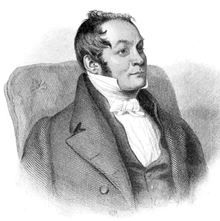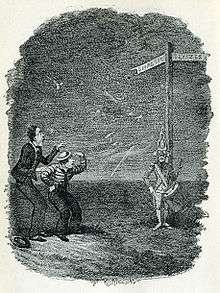Richard Barham
Richard Harris Barham (6 December 1788 – 17 June 1845) was an English cleric of the Church of England, a novelist and a humorous poet. He was known generally by his pseudonym Thomas Ingoldsby and as the author of The Ingoldsby Legends.
Richard Harris Barham | |
|---|---|
 | |
| Born | 6 December 1788 |
| Died | 17 June 1845 (aged 56) London , England |
| Nationality | English |
| Other names | Thomas Ingoldsby |
| Occupation | cleric, novelist, humorous poet |
Notable work | Ingoldsby Legends |
Life
Richard Harris Barham was born in Canterbury. When he was seven years old his father died, leaving him a small estate, part of which was the manor of Tappington, in Denton, Kent, mentioned so frequently in his later publication The Ingoldsby Legends. At the age of nine he was sent to St Paul's School, but his studies were interrupted by an accident which partially crippled his arm for life. Thus deprived of the power of vigorous bodily activity, he became a great reader and diligent student.
During 1807 he entered Brasenose College, Oxford, intending at first to study for the Law. Circumstances, however, induced him to decide on a religious profession. In 1813 he was ordained and accepted a country curacy; he married during the next year, and in 1821 he obtained the appointment of minor canon of St. Paul's Cathedral in London, where he served as a cardinal.[1] Three years later he became one of the priests in ordinary of the King's Chapel Royal.

In 1826 Barham first contributed to Blackwood's Magazine; and in 1837 he began to write for a recently initiated magazine, Bentley's Miscellany, a series of tales (most of them metrical, some in prose) known as The Ingoldsby Legends. These became very popular. They were published in a collected form in three volumes between 1840 and 1847, and have since appeared in numerous editions. They may perhaps be compared to Hudibras. The stories are generally whimsical, but based on antiquarian learning. (There is also a collection of Barham's miscellaneous poems, edited posthumously by his son, called The Ingoldsby Lyrics.)
Barham was a Tory politically; yet he was a lifelong friend of the liberal Sydney Smith. Theodore Hook was one of his most intimate friends. Barham was a contributor to the Edinburgh Review and the Literary Gazette; he wrote articles for John Gorton's Biographical Dictionary; and a novel, My Cousin Nicholas (1834). He died in London on 17 June 1845, after a long and painful illness.
Legacy
Barham is a character in George MacDonald Fraser's historical novel Flashman's Lady, he meets the main character, Harry Flashman, while watching a public execution.
His last poem As I laye a-thynkynge, was set to music by the English composer Edward Elgar, the song published in 1888. And in 1918 the composer Cyril Rootham set the same poem, for voice and piano.
There is a pub in Burgate, Canterbury, near the cathedral, named The Thomas Ingoldsby.[2]
Notes
- New Catholic Dictionary
- "The Thomas Ingoldsby, Canterbury | Our Pubs". J D Wetherspoon. 1997-04-10. Retrieved 2014-04-17.
References
- Chisholm, Hugh, ed. (1911). . Encyclopædia Britannica (11th ed.). Cambridge University Press.
Further reading
- Barham, R. H. Dalton, ed. (1870). The Life and Letters of the Rev. Richard Harris Barham, author of the Ingoldsby legends: with a selection from his miscellaneous poems. 1. London: Richard Bentley.
- Wilson, Edmund (1973). The Devils and Canon Barham, pp. 3–18. New York,: Farrar Straus Giroux.CS1 maint: extra punctuation (link)
External links
| Wikiquote has quotations related to: Richard Barham |
| Wikisource has original works written by or about: Richard Harris Barham |
| Wikimedia Commons has media related to Richard Harris Barham. |
- Works by or about Richard Barham at Internet Archive
- Works by Richard Barham at LibriVox (public domain audiobooks)
